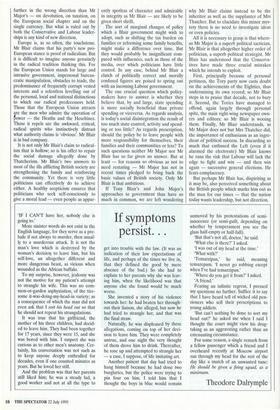If symptoms
persist. . .
'IF I CAN'T have her, nobody else is going to.'
More sinister words do not exist in the English language, for they serve as a pre- lude if not always to murder, then usual- ly to a murderous attack. It is not the man's love which is destroyed by the woman's decisiog to leave him, but his self-love, an altogether different and more dangerous beast, as vicious when wounded as the African buffalo.
To my surprise, however, jealousy was not the motive for my patient's attempt to strangle his wife. This was no com- mon-or-garden asphyxiation, of the tire- some it-was-doing-my-head-in variety; as a consequence of which the man did not even ask that I sort his head out so that he should not repeat his strangulations.
It was true that his girlfriend, the mother of his three children, had decid- ed to leave him. They had been together for 17 years, since they were 15, and she was bored with him. I suspect she was curious as to other men's anatomy. Cer- tainly, his conversation was not such as to keep anyone deeply enthralled for decades, even if one counted minutes as years. But he loved her still.
And the problem was that her parents still liked him; he was a steady lad, a good worker and not at all the type to get into trouble with the law. (It was an indication of their low expectations of life, and perhaps of the times we live in, that they defined the good by mere absence of the bad.) So she had to explain to her parents why she was leav- ing him, when the likelihood was that anyone else she found would be much worse.
She invented a story of his violence towards her: he had beaten her through- out their liaison, she alleged, but now he had tried to strangle her, and that was the final straw.
Naturally, he was displeased by these allegations, coming on top of her deci- sion to leave him. They were completely untrue, and one night the very thought of them drove him to drink. Thereafter, he rose up and attempted to strangle her — a case, I suppose, of life imitating art.
Another patient that day had tried to hang himself because he had done two burglaries, but the police were trying to pin four on him. I told him that I thought the boys in blue would remain unmoved by his protestations of semi- innocence (or semi-guilt, depending on whether by temperament you see the glass half-empty or half-full).
'But that's not all, doctor,' he said. 'What else is there?' I asked.
'I was out of my head at the time.' 'What with?'
`Temarzipan,' he said, meaning temazepam. 'I never go robbing except when I've had temarzipan.'
'Where do you get it from?' I asked. 'A friend.'
Fearing an infinite regress, I pressed my questions no further. Suffice it to say that I have heard tell of wicked old pen- sioners who sell their prescriptions to young addicts.
'But can't nothing be done to sort my head out?' he asked me when I said I thought the court might view his drug- taking as an aggravating rather than an extenuating circumstance.
For some reason, a single remark from a fellow passenger which a friend and I overheard recently at Moscow airport ran through my head for the rest of the day like a snatch of an unwanted tune: He should be given a firing squad, as a minimum.
Theodore Dalrymple


















































 Previous page
Previous page